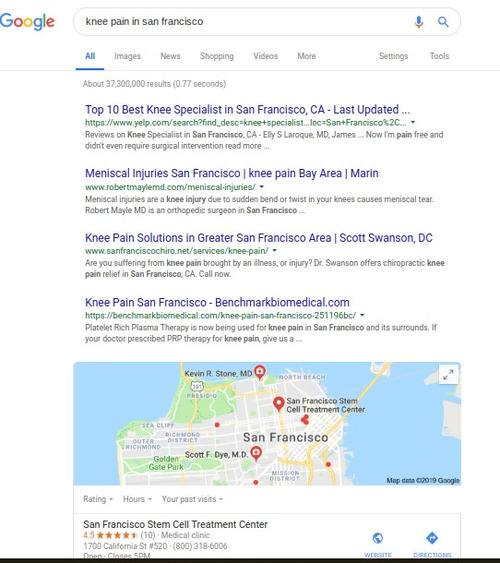With more than a billion sites online, competition is fierce across nearly every sector. Brands try to get their voices heard above the noise. In a number of industries, however, there are sites that dominate the search engine results pages and seem nearly impossible to overtake. This is why your content marketing for small business strategy is extremely important.

Take for example the medical industry and websites like WebMD, Healthline, or Cleveland Clinic. In the film and entertainment industry, IMDB and Rotten Tomatoes can be found at the top of the SERP. Wikipedia also presents a considerable indirect competitor for many brands to try and outrank.
For brands that have sites closely tied to keywords that these major sites rank well for, it can seem futile to try and figure out how rank highly when competing against these major sites. That does not mean, however, that SEO and content marketing overall cannot be used.
Understanding how to create content that performs well in these situations, and how brands can bolster performance, is important for realizing the full potential of content. Here's what you need to know about content marketing for small business.
Create content that is location specific
Many smaller brands focus on location-specific audiences. For example, a local medical provider or practitioner might treat patients within a specific geographic location or a local events organizer might focus more on local entertainment.

These brands should look for opportunities to create content geared towards their local audience. The targeted audience might be smaller, but the use of local keywords will help them appear in local searches for people in their area.
Think carefully about what people in the immediate area might be looking for when developing content. Consider places, landmarks, local names, or other factors that might show up as terms in people’s searches in the area. You can even incorporate factors, like weather or local events that might encourage people to make related searches that wouldn't occur to larger brands trying to appeal to people across a wide variety of locations.
Target less-popular keywords for content marketing for small businesses
In every industry there tend to be less-popular keywords brand websites often ignore. They opt instead to optimize for the most popular keywords that have the greatest potential for traffic. In a situation where you are trying to compete with large brands with excellent reputations, however, sometimes these less popular keywords can be an important part of optimization.
By creating content for less-popular keywords you create opportunities for your brand to start building your brand reputation. You will be able to brand yourself as an expert in your industry and your site will rank for important keywords, even if they aren't the most common searches. As you build your domain reputation, that bedrock foundation will help your brand build rankings across all of your pages.
Take keywords in slightly different direction
You can also create content that takes a slightly different look at some of your most common keywords. You can focus on slightly different areas of concern for users. For example, say you are a medical practice. You know that trying to compete with WebMD and Mayo Clinic on general articles pertaining to different diseases and conditions would be a big challenge.
You can, however, focus on creating content related to treatment, what to expect during treatment, how your office treats this particular condition, or optimize for treatment related to this condition within your area.
To consider the type of content that will provide the most value for your organization, think about the types of questions and concerns that customers or prospects often approach your organization with. This will provide you with valuable insight into the issues and concepts that matter the most to them, helping you find the topics that will most likely appeal to other prospective customers.
Incorporate paid search strategies
For your high-value keywords where the first page of search results remains dominated by major brand names in your field, the best way to get your brand recognized will be to use a paid search strategy. PPC will get your content featured at the top of the SERP, putting you directly in front of prospective customers.
Developing a strong PPC strategy requires understanding what people generally want to see when they land on a particular SERP. Research what the SERP looks like currently to get a better understanding of the typical user intent of users. Both your ad and your landing page will need to reflect these desires.
You ad will need to closely reflect what other search results look like. Examine how the results are formatted and how descriptions are worded. Your ad should take this information into account and also reflect what sets your organization apart.
Your landing page will also contain what users want to see. It should provide high quality information that reflects what visitors would see on any of your competitor's sites.
Monitor your success with PPC closely. Since you have to invest more monetarily, you will want to make sure you derive maximum value. Look at your click through rate as well as the number of conversions and revenue you secure with each lead. This will allow you to calculate the value of your efforts with PPC, setting you up for the optimum conversion rate.
Focus on your social media presence
Social media can also provide organizations with a powerful means of getting out from under the umbrella of larger companies. The modern consumer spends a lot of time on social media--an estimated 77% of Americans have at least one profile, and Nielsen reports that Americans over the age of 18 spend an average of 45 minutes on social media every day. This makes social a great way for people to interact with potential customers.
When it comes to building a strong profile, you do not have to worry about outranking your competitors. The most important aspect will be creating a profile that engages users in your target demographic. Interacting with people, encouraging them to post on your page-- which means that their engagement with your profile shows up in the feeds of all their connections, and otherwise using social media as a means of building a personal connection with users all create an excellent opportunity to stand out from the others in your industry. Customers greatly appreciate this personal connection with brands they consider doing business with.
Given the immense size of some brands that dominate the SERPs, creating a more personal, intimate connection with followers might not be as feasible. This makes it a fantastic place for smaller organizations to shine. Consider how you can take advantage of your smaller size to bring a more individual touch to your social followers.
Fighting for space on the SERPs is something that brands of all sizes must do. Sometimes, however, it can feel like a David vs. Goliath fight, and the smaller companies know that keyword research alone will not be enough for them to overtake the large, reputable, and well-cited content that dominates the top slots for their industry keywords. Understanding how to build a successful marketing strategy despite this obstacle, however, can help brands see success in content marketing for small business.


